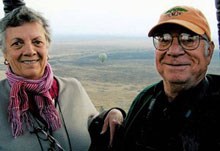Earlier this year, Earl and Paula Bracker of Cambridge marked their seventieth birthdays, organized a three-generation family reunion, and went on safari in Tanzania all at the same time.
|
The Brackers took 26 people themselves, their grown children and their spouses, and a dozen grandchildren aged 6 to 14 to the East African nation for two weeks in August. Their trip was an adventure for more reasons than the exotic setting. Because the Brackers married just 12 years ago, and because their grown children were scattered across the country, it was the first time their combined clans had ever gathered in one place. (The previous record was 17, at a Thanksgiving dinner a few years ago.)
Arranging such a get-together in unfamiliar surroundings halfway around the world was, admittedly, an ambitious move, but it worked. By the time the travelers split up to return to their homes, "it wasn't her kids and my kids," says Earl Bracker, a retired University Health Services physician. "They were planning get-togethers in the fall. The family was meshing beyond us."
The desire to renew ties with relatives (or, as with the Brackers, to create them in the first place) is the driving force behind a growing trend: combining reunions and vacations. Two-thirds of the 400-plus travel agents polled last year have noted increases in requests for booking family-reunion trips in the past five years, according to a recent study by the Washington, D.C.-based American Society of Travel Agents. About one-third of all U.S. adults have traveled to a family get-together in the past three years, according to the Travel Industry Association of America, also based in Washington, D.C. A slight majority (52 percent, according to the industry trade group) were still headed to a relative's home, but the rest were bound for reunions in other places.
About 30 to 40 percent of the trips that Thomson Family Adventures, a Watertown, Massachusetts-based tour operator, books these days are for multigenerational family groups. "I just had a huge booking for 19 people two grandparents, their kids, and their grandchildren for Ecuador and the Galápagos Islands," says tour coordinator Renee St. James. "It's definitely a huge market." And, as in the Brackers' case, it's frequently the grandparents who initiate and pay for the trip.
The venues are as varied as the families themselves. People hold reunions at theme parks, national forests, dude ranches, country inns, and big-city hotels. Some build the event around an activity, such as hiking or skiing. Some plan around a major sporting or cultural event. Others travel to an ancestral homeland, such as Ireland, Italy, or Japan.
Many gather on or near the water. They rent lakeside cabins or oceanfront condominiums, take luxury cruises, sail the coast in tall ships, or travel along inland waterways on riverboats or canal barges. Active families may decide to go kayaking or whitewater-rafting together.
Package deals such as those Caribbean cruises, all-inclusive resorts, and guided tours are increasingly popular because somebody else handles most of the planning and all the work onsite. That's a major draw for couples like Nancy and Ed Roberts of Boston, who have coordinated several three-generation trips in recent years. Their 17-person extended family, which includes nine grandchildren under 10 years old, has visited resorts in the Dominican Republic and Puerto Rico and taken a guided tour of Costa Rica. This year, they've arranged a similar all-inclusive tour of Belize. "This way, no one has to cook," says Nancy Roberts. "No one has to worry about anything. It's a real, true vacation for everyone."
|
It's also a reunion even though two of her grown children live near Boston and the third lives in Connecticut. "They don't see each other that much," says Roberts, a Lesley University professor of education. "Their kids' lives are so busy, with all their after-school activities. They mostly see each other on holidays and birthdays."
Although various factors influence the outcome of an on-the-road reunion (see "Four Tips"), travel experts stress that two steps are critical for any family trip's success.
Set dates as early as possible. That's important both for working around job and school schedules and for locking in preferred times and venues. "Everyone wants to travel over the holidays and in the summer," says Jim Kackley, general manager of Thomson Family Adventures. "Flights have gotten nothing but worse during those times." In addition, families traveling together typically need large blocks of accommodations; the longer they wait, the less likely they'll find suitable space together. For those reasons, Kackley recommends setting up trips at least 12 months in advance. But many families start much earlier: the Brackers began planning their Tanzania trip two years ahead of time. (Because anything can happen between the booking and departure dates, families should consider travel insurance, to protect against financial losses if they must cancel or postpone a trip.)
|
Consider each person's age, health, and physical condition. Keep in mind, for instance, that someone with heart or respiratory trouble may be uncomfortable at high altitudes. People who use wheelchairs or canes may need to avoid rough terrain. And those with food allergies or diabetes may need special mealtime arrangements. Families with infants or toddlers should consider bringing a nanny; those with just one teenager may want to let that youth take a friend.
A good rule of thumb: "Design your trip toward the kids and give the older people a chance to opt out," Kackley says. The best way to keep kids happy, experts agree, is to involve them from the start. The children in the Bracker group, for example, volunteered to do research on the wildlife they hoped to see in Tanzania. Tour planners also put them in touch with pen pals of similar ages there; the children corresponded beforehand and got together during the visit. "If the kids are happy," Kackley says, "the rest tend to be."
Anne Stuart is an assistant editor of this magazine.









